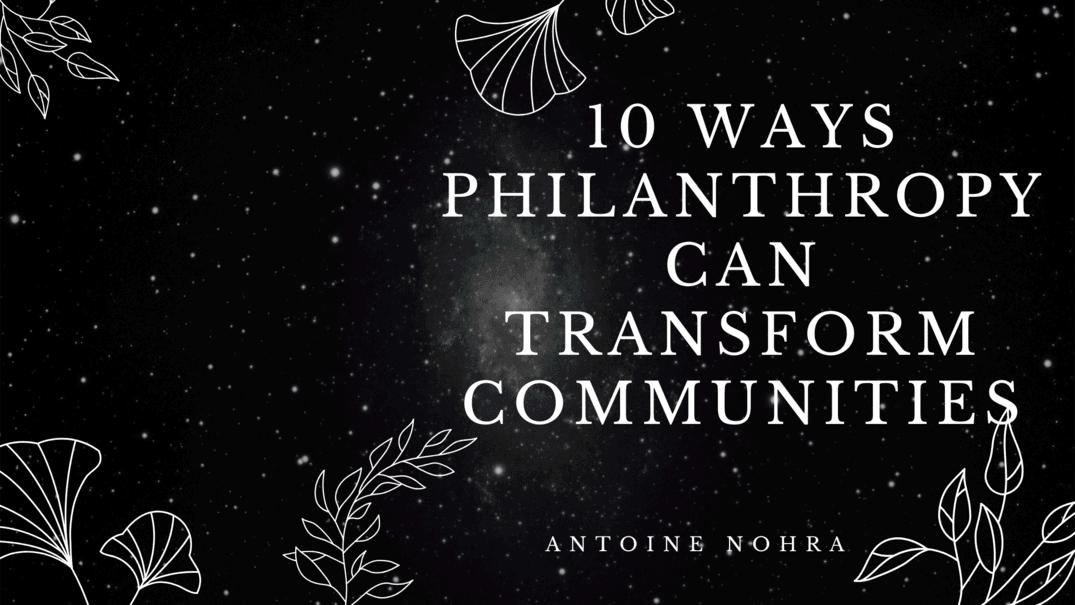10 Ways Philanthropy Can Transform Communities
by antoinenohra | Apr 23, 2025 | Antoine Nohra, Philanthropy

Introduction
Philanthropy is one of the most powerful tools for creating lasting change in communities. It is not just about monetary donations but about investing time, skills, and resources to tackle pressing social, economic, and environmental issues. At its best, philanthropy brings people together, uplifts marginalized groups, and creates sustainable solutions to persistent challenges. While often associated with large foundations and wealthy donors, it is a practice that anyone, at any level, can embrace. Let’s explore 10 impactful ways philanthropy transforms communities for the better.
What Is Philanthropy?
Philanthropy is derived from the Greek word “philanthrōpía,” meaning “love of humanity.” At its core, it is about giving—whether it be money, time, or expertise—to help others and promote the common good. Unlike charity, which often focuses on immediate relief for suffering, philanthropy aims to address the root causes of issues, fostering long-term systemic change. This approach makes it a cornerstone of sustainable community development.
Economic Impact of Philanthropy
Philanthropy has a profound economic impact. Investments in local businesses, job training
programs, and infrastructure development help communities thrive. For example, when philanthropists fund initiatives such as vocational schools or provide microloans to small businesses, they stimulate local economies. These programs not only create jobs but also empower individuals to achieve financial independence. A single scholarship, for instance, can lead to a ripple effect as educated individuals return to their communities to contribute their skills.
Promoting Education
Access to education is one of the most transformative gifts philanthropy can provide. From building schools in underserved areas to funding scholarships for higher education, philanthropic efforts make learning accessible to all. Education helps break the cycle of poverty, empowering individuals to pursue better career opportunities and contribute meaningfully to society Initiatives like book donation drives or digital literacy programs enable even more people to benefit from the power of knowledge.
Empowering Women and Marginalized Groups
Philanthropy has a crucial role in creating a more inclusive society. By supporting initiatives like women’s leadership programs, gender equality campaigns, and microfinance projects, it empowers marginalized groups to overcome systemic barriers. For example, organizations such as the Malala Fund use philanthropic contributions to promote girls’ education globally, demonstrating how targeted efforts can create widespread change.
Health Benefits of Philanthropy
Community health programs funded by philanthropic organizations save lives. From building hospitals and clinics to funding research on rare diseases, these efforts directly impact quality of life. Free health camps, mobile clinics, and vaccination drives in remote areas are examples of how philanthropy ensures healthcare reaches those who need it the most. Additionally, mental health initiatives supported by philanthropic donors play a key role in combating stigma and providing critical resources.
Environmental Philanthropy
As climate change becomes a growing concern, environmental philanthropy has taken center stage. Communities benefit greatly from programs that promote renewable energy, tree planting, and waste management. Funding for sustainable agriculture projects helps ensure food security, while clean water initiatives address one of the most basic human needs. Environmental philanthropy ensures that future generations inherit a planet that is livable and thriving.
Philanthropy Through Volunteering
Time and effort can often be more valuable than monetary donations. Volunteering brings communities together, fostering a sense of unity and shared responsibility Whether it’s organizing a local clean-up, mentoring youth, or serving meals at a shelter, volunteers make a tangible difference in people’s lives. Volunteering also reduces social isolation and boosts the well-being of both those who give and those who receive.
Corporate Social Responsibility (CSR)
Corporate philanthropy is a growing trend, with businesses investing in community development programs. Companies that embrace Corporate Social Responsibility (CSR) not only build a positive
brand image but also contribute significantly to social progress. Initiatives like funding STEM education, sponsoring community events, and creating inclusive workplaces highlight the role businesses play in creating thriving communities.
Long-Term Impact of Philanthropy
The beauty of philanthropy lies in its enduring impact. While immediate assistance is valuable, the true potential of philanthropy is realized through sustained efforts that create long-term change. For example, funding a literacy program might help individuals secure better jobs, improving their economic prospects for years to come. Similarly, supporting affordable housing projects can stabilize entire communities.
Conclusion
Philanthropy is the lifeblood of thriving, equitable communities. Whether it’s through monetary donations, volunteering, or corporate initiatives, the act of giving transforms lives in profound and lasting ways. As individuals, we all have the power to contribute to this transformation, no matter the scale. So, the next time you consider making a difference, remember that even small acts of philanthropy can create a ripple effect of positive change in the world.
